News for 08 September 2020
All the news for Tuesday 8 September 2020
Ultimate goal is to create history at Tokyo Olympics, says India women's hockey team player Neha Goyal
Neha Goyal, who has played 75 matches for the national team so far, is currently at the SAI South Centre in Bengaluru for the national camp which concludes on 30 September.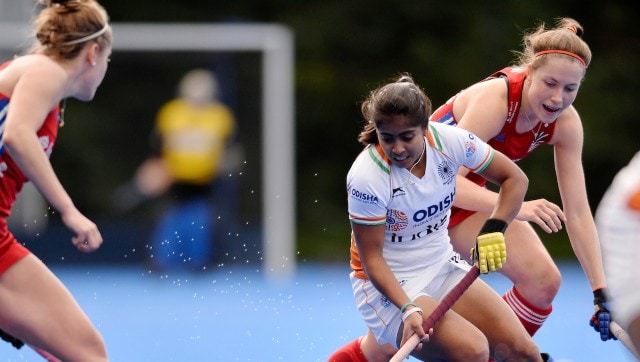
File image of Neha Goyal. Image: Hockey India
Bengaluru: Indian women's hockey team midfielder Neha Goyal on Monday said after a successful 2019 and a COVID-interrupted current year, their ultimate goal right now is to create history in Tokyo Olympics.
"Our sole focus is on the Tokyo Olympics at the moment. We have been working hard on our fitness in the last few months and we will do everything we can to keep getting better at our game in the next few months.
"We had a fabulous 2019 after winning the FIH Women's Series Finals and booking a place in the Olympics through the FIH Hockey Olympic Qualifiers," Goyal was quoted as saying by a Hockey India statement.
"We have competed well against top teams in the recent past and therefore we have the belief that we can make history in Tokyo next year. It's our ultimate goal," added the 23-year-old.
Goyal, who has played 75 matches for the national team so far, is currently at the SAI South Centre in Bengaluru for the national camp which concludes on 30 September.
Recollecting the hardships she and her family faced while trying to pursue a career in hockey, Goyal said: "It was really tough for me when I started playing hockey in the fifth standard. My mother would work day and night to make sure that we had enough food and therefore it was very difficult for her to save some money for my equipment.
"And once I made it to the top level, I faced numerous injuries and was out of the Indian team for a long time. However, the most important thing for me was that I never gave up."
Goyal considers former India captain Pritam Rani Siwach as her inspiration.
"When I was in the fifth standard, I used to see Pritam didi's photographs in the local newspaper and I used to go and watch her play in a local ground. One day she asked me why I go to the ground everyday and it was then I told her that I want to play the game," she said.
"Since my parents couldn't afford hockey equipment for me, Pritam didi provided the equipment to me and encouraged me to work hard on my game. I wouldn't have reached where I am today without her support."
Firstpost
Long journey of Jude Felix, a perspective
Text and Images K. Arumugam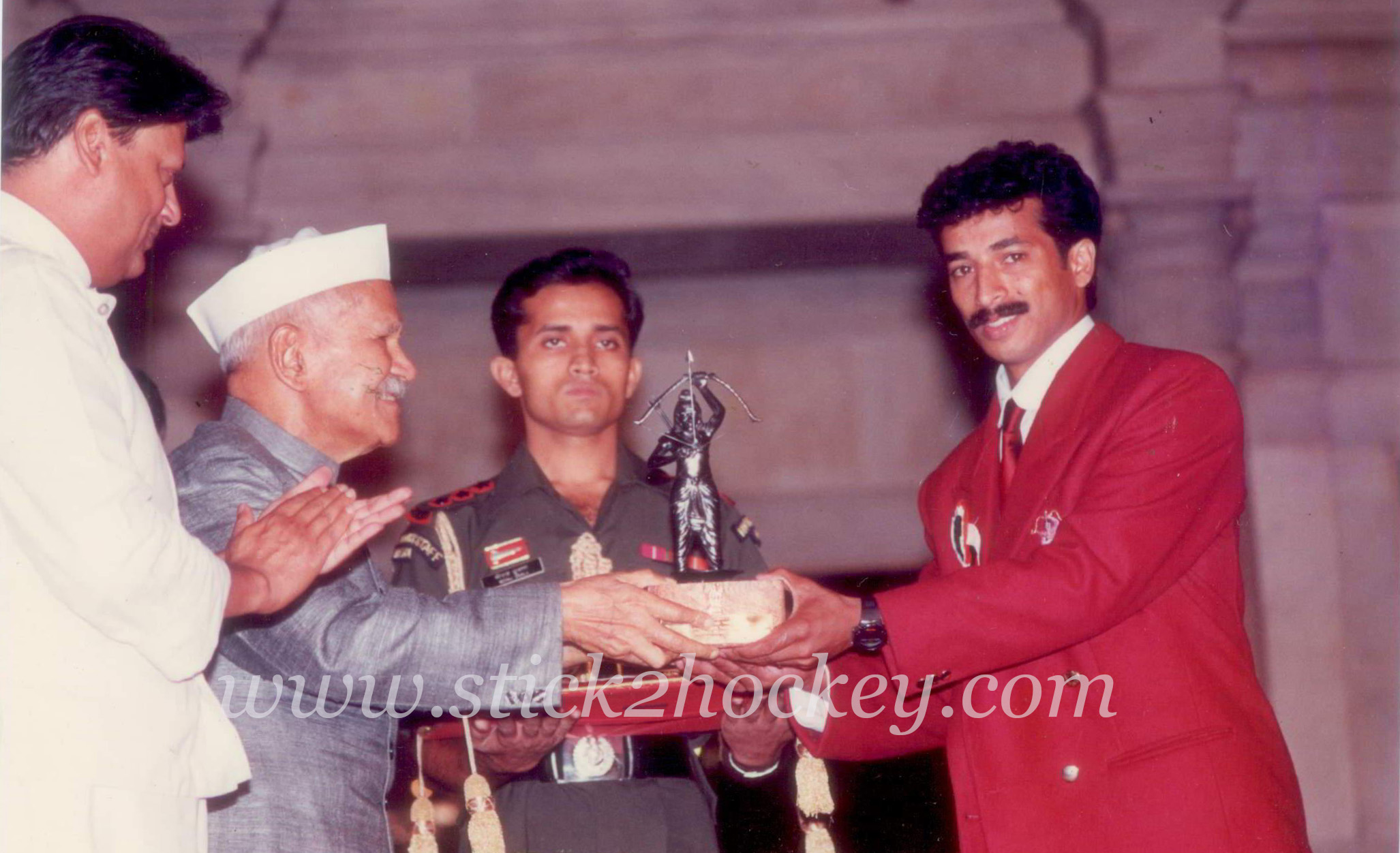
When I entered the sprawling National Stadium campus before it was renamed after the hockey wizard Dhyan Chand, it seemed I was late. The morning practice under the watchful eyes of Balkishen Singh was over. The players were scattered and just two were resting on the verdures adjacent to main turf.
These were Jude Felix and Dhanraj Pillay. The latter was a well known face while the former was a relative newcomer, having spent barely two years on the international circuit.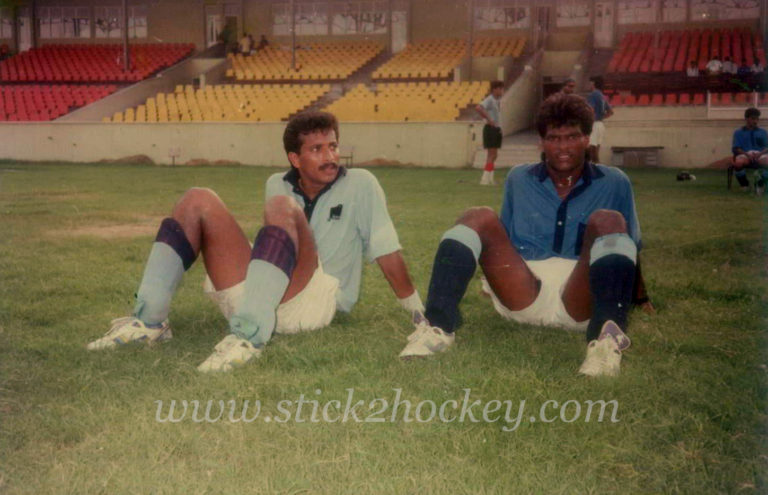
Jude Felix (l) and Dhanraj Pillay, 1991
The team was preparing for the Sultan Azlan Shah Cup. Having spotted at least two players, I did not want to miss the opportunity. I rushed to them with my tape recorder in one hand and asked the first question to Jude Felix moving as close to him as possible.
Felix, took another gulp of water, almost broke into a smile before saying, “First tell me, who are you?”
It was my first interview of a national level player of his stature. I know him but, it struck me, there was no way he would have known me.
“Jude waved me off when I took a snap of both moments earlier, perhaps he would have thought me to be just another fan. I took it that way. Having started on a wrong note, I experienced one of those bad days in my early phase of journalism that day.
My questions, ex tempore, were so mundane and perfunctory, he had no difficulty in answering them all.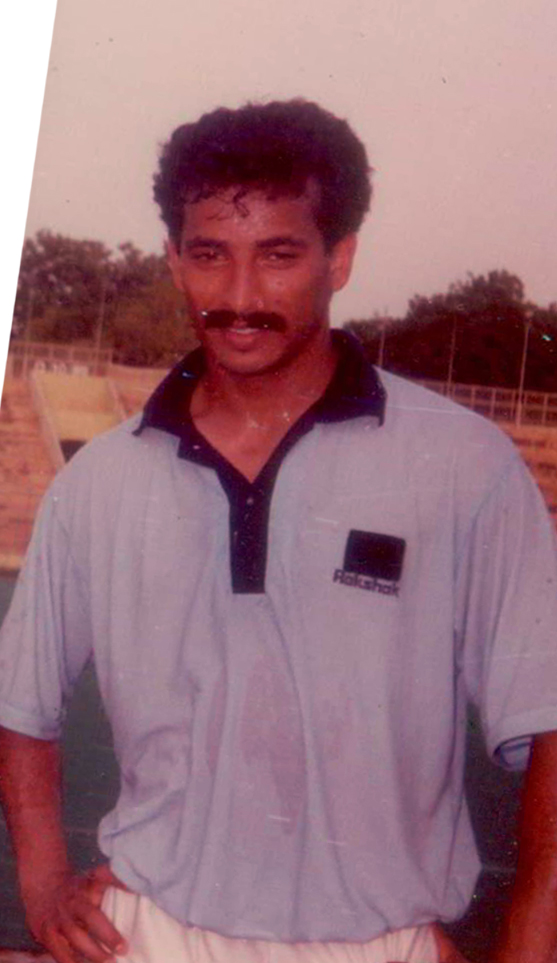
Jude Felix in 1992
The maturity and patience Jude Felix showed and the continuity of his conversation that day left an indelible impression. Luckily enough, Dhanraj Pillay chipped in to know whether I write for Tamil papers as well. I nodded, saying, “yes, Dinamalar”. He too joined the conversation and spoke very enthusiastically. Despite my poor start, the session went well, especially since I had achieved a ‘double’.
During those times, in the early 1990s, the entire team revolved around two personalities — Felix and Pargat Singh. Pargat was media savvy, brash and blunt while Felix was word-wise, sophisticated but crafty. Felix had just moved from the inside-forward position to centre-half and being the pivot, he initiated much of the play.
A few months later, India won the Sultan Azlan Shah Cup played in a round-robin format, beating Pakistan 1-0 with an immaculate goal by Mukesh Kumar. Few months earlier, they undertook a successful Europe tour, and were poised for another. The European Tour, a build-up to the Barcelona Olympics, was the focus. It turned out to be successful with India winning 12 of 15 matches.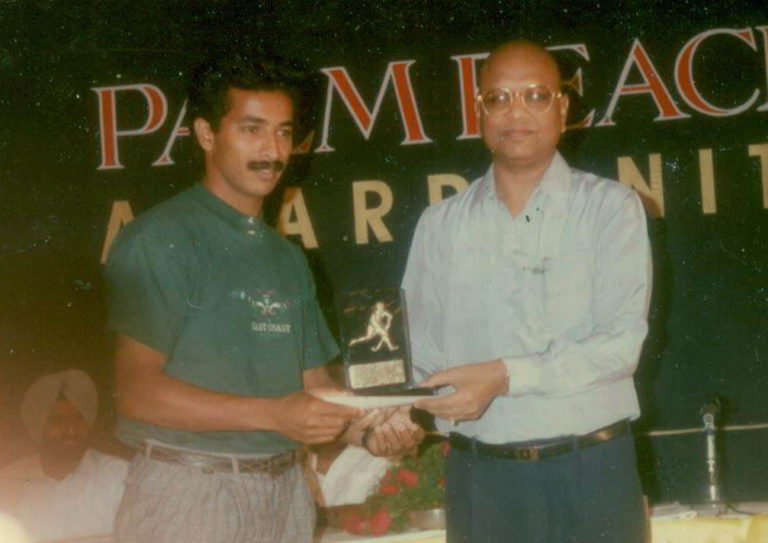
Jude receiving Best Player Award for GB test, 1992
The media hyped up the success which anyway helped bring an unprecedented high-end sponsorship from a distillery company, Chhattisgarh Distilleries Ltd. Their ‘Palm Beach’ brand presented hefty rewards at a function in Le Meridien hotel in New Delhi. Not since 1975 was a hockey team feted so grandly, one thought.
But all the grandeur turned out to be too-much-too-soon. Also, the manner in which the team was handled both by the IHF and the sponsors didn’t help the cause. Hyped-up India buckled under pressure in Barcelona, finishing seventh at the 1992 Olympics. MM Somaya in his signature column cited only Jude Felix and Shakeel Ahamed for playing to potential at Barcelona.
Pargat Singh announced the first of his several retirements and other stars like Jagbir Singh were dropped for unknown reasons. Chief coach Balkishen Singh was sacked and Zafar Iqbal succeeded him. His team visited South Africa for a Series and Austria for the Alps Cup.
The most important event in that phase was the Inter-Continental Championship, a qualifier for the Sydney World Cup. India fared well there to enter the semifinals and win a bronze besides qualifying for the World Cup. The nation’s mood was a bit upbeat and it seemed India was bouncing back after the Barcelona debacle.
However, Felix had other ideas. After Poznan, he moved to a foreign club in France. Dhanraj Pillay also joined him. The move drew ire from most administrators and Olympians. Even some questioned his patriotism, as if it was their preserve.
New coach Iqbal, preparing teams for the Hiroshima Asia Cup was as blunt as usual. He did not mince words or hide his disappointment on the matter. Some select news items of those times are given in the link: Jude Felix paper cutting.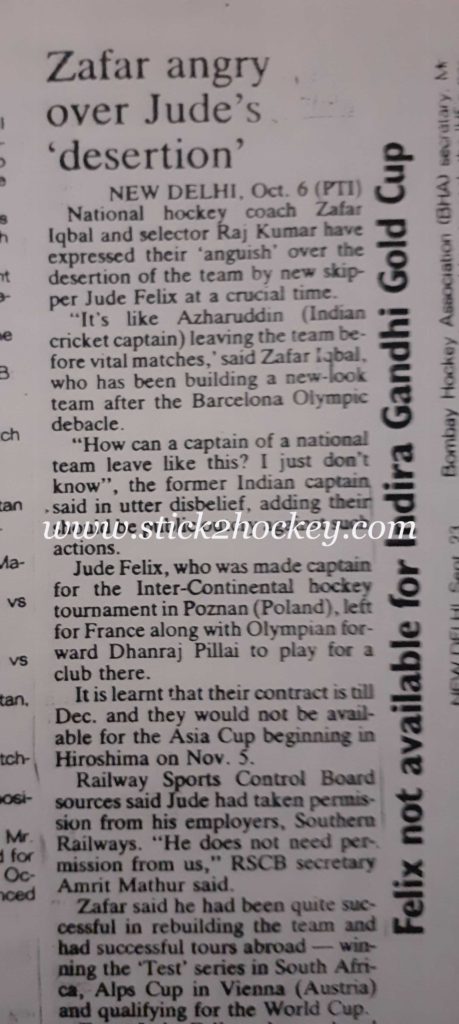
Hindustan Times, New Delhi
But mature and composed, Jude Felix was rooted in his move. There was no gag on players in those days and his interviews were all over the media. He made his position clear: What if you are ignored for the Asian Games and World Cup? He asserted that it was no big deal as he had other offers. When asked as to why he prefered overseas assignments over local engagements, Felix said that at the end of his devotion to hockey he had nothing to show (June 1993, The Hindu).
He uttered those words he said when he was a veteran of 12 years standing. While most of his peers retired, he maintained fitness, was in form and in demand. Those were the days players represented the country only for pride, their income being limited to government salary.
Thus, knowingly or unknowingly, Jude Felix sowed the seeds of semi-professionalism in Indian hockey. He was targeted and sought to be isolated in the eyes of the public, the kind of trauma a pioneer in any field has to endure.
His was perhaps the first move by any Indian player and it showed others the way. So many players these days travel to foreign lands, make a name for themselves, earn and live better. Something unheard of in the era Felix was an active player. Dhanraj Pillay of course did what he did together with Jude, in his entire career: Choosing Indian assignments.
Many notable writers of the day like John Crasto, Arvind Lavakare, Jagannath Rau and others supported Felix’s moves and his steadfast refusal to even play in the Asia Cup seemed to bring the curtain down his career once for all.
Shakeel Ahmed was chosen to lead the side in the absence of Felix. Sandeep Somesh took his position in the team. Pillay returned to join the team for the Hiroshima campaign. Though the federation and coaches accused him, when Felix returned after completing his first French assignment and then a stint in Malaysia, they were ready to take him back in the team. Such was his reputation and the administration’s magnanimity, unthinkable in the present times. The administration then was openly brash and abusive but by action was mostly harmless.
His name didn’t appear among the probables for the 1994 Hiroshima Asian Games released in July 2014, but Felix was included in the final camp. His captaincy was also restored. India had a wonderful Asiad but lost the final 2-3 to South Korea.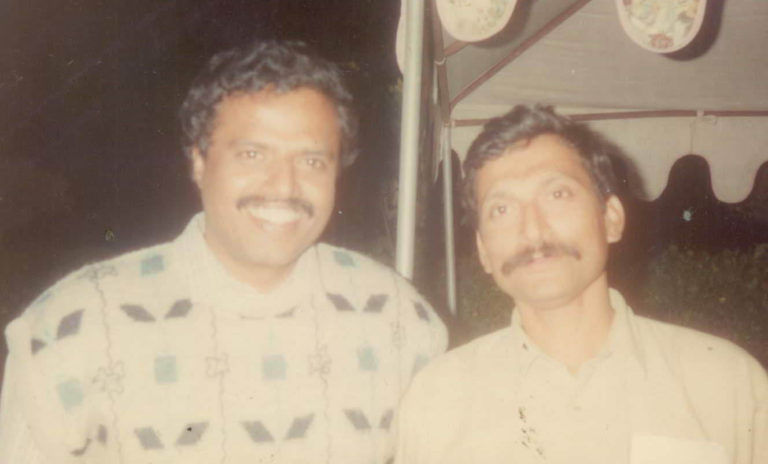
Coach Cedric D’Souza (r) and Jothi Kumaran, then IHF secretary facilitated Jude’s comeback in late 1994.
Felix, in fact, has to thank providence for a change of guard in the IHF. His case and career received a shot-in-the-arm when the old guard in the federation gave way to the KPS Gill-Jothi Kumaran combine after the Bhopal elections in September 1994, a month before the Hiroshima Asian Games.
The new team was unbiased about the past and created an atmosphere for most players to return.
The first show after their election was the organization of Federation Cup in Jalandhar, which was construed as selection trials for Hiroshima. Felix was drafted into leading the Tamil Nadu team. He represented his employers Indian Railways but chose between them and his domicile state Karnataka up until then. However, the then IHF secretary K. Jothikumaran was on record saying that since Southern Railway is affiliated to Tamil Nadu, it’s right in the eye of the tradition to include Felix.
Railways CR Kumar, who rose to coach the women’s national teams of India and Malaysia, was also part of the Tamil Nadu team that played the Jalandhar Federation Cup. As merit would count, Felix was back for national duty and captaincy was also at stake for him to claim.
Such was his stature that nobody could have objected to him being given captaincy. After all, he led India to the silver medal at the 1994 Hiroshima Asian Games where South Korea coach Kim Sang Ryul and forward Park Shin Heum were at their best in the final which India lost by the odd goal in five. in that encounter, Anil Aldrin’s brace of penalty corner goals were nullified by the likes of Park Shin Heum.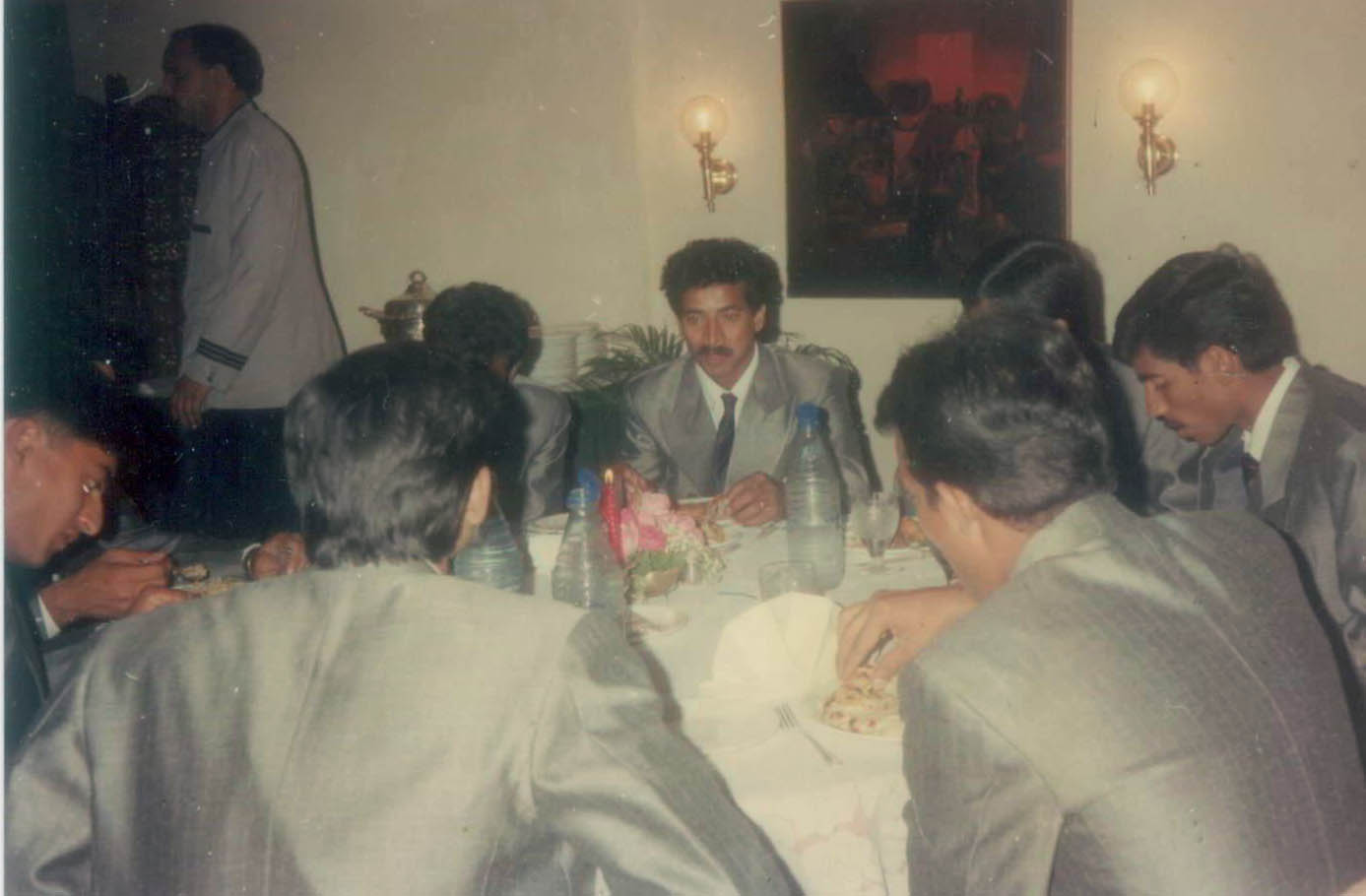
1994 World Cup team at a send-off gathering in New Delhi
The silver show, however, saw coach Zafar Iqbal being shown the way out. In came Cedric D’Souza. The team, devoid of many wonted trouble makers, surprised everybody at the 1994 Sydney World Cup.
The fifth-place finish the Jude Felix-Cedric D’Souza combo achieved is by far the best show at either the World Cup (title won in 1975) or Olympics since Moscow 1980 where India last won the Olympic gold medal.
Big sponsorship came in early 1995 when Sahara for the first time stepped into sports. The Indira Cup was renamed Sahara Cup with five latest brand cars lined up for individual awards! Felix led India to silver again, formidable South Korea again being the nemesis in the final witnessed by the then Prime Minister Narasimha Rao.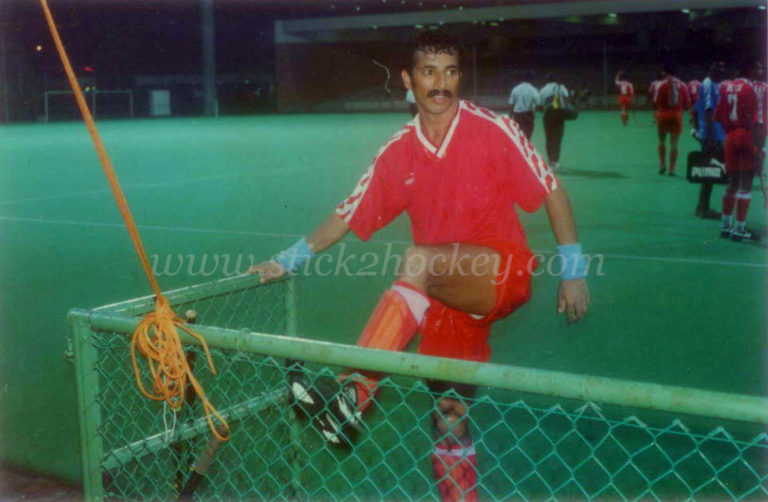
Jude playing for SRC, Singapore, 1995
Early in 1995, Jude Felix made another significant move. He went to Singapore to take up coaching at the Singapore Recreation Club (SRC). As a leading player in the country, it was bold move. With KPS Gill in his first stint at the IHF, things looked bright. However, Felix who knew the nuances and intricacies of how Indian hockey functions, chose greener pastures which provided him new avenues.
He again set the trend to bid adieu to international hockey when he could have persisted and faced the consequences like many of his contemporaries and predecessors did.
When Felix coached SRC, India ‘A’ coach Vasudevan Baskaran fought for Pargat Singh’s return and took the team to the Sultan Azlan Shah Cup. India were the defending champions and retained the trophy.
The victorious team was scheduled to play a test series against Singapore. However, only friendly matches were played. Jude Felix who was part of the 1991 team that won the Azlan Shah and who would have played this time around too but for his decision to leave India for the SRC job, played against India in the friendly. It was amid festive atmosphere, fun and frolic.
I interacted with him several times during the Singapore sojourn and many of my comprehensive interviews with him were published in Sportsworld. I spared eight pages exclusively for him in the first of the many hockey year books I authored and published in 1995.
The same year he made a quick visit to Delhi to receive the Arjuna. After receiving the award he came to the National Stadium where the Prime Minister was gracing a sporting occasion. He had difficulty in getting into the stadium as the security staff would not allow him to enter through the Air India Academy gate. Infuriated fans at the gate together impressed on the security staff that they allow Felix entry. They finally relented and Felix went in. Many, including this writer, were not that lucky.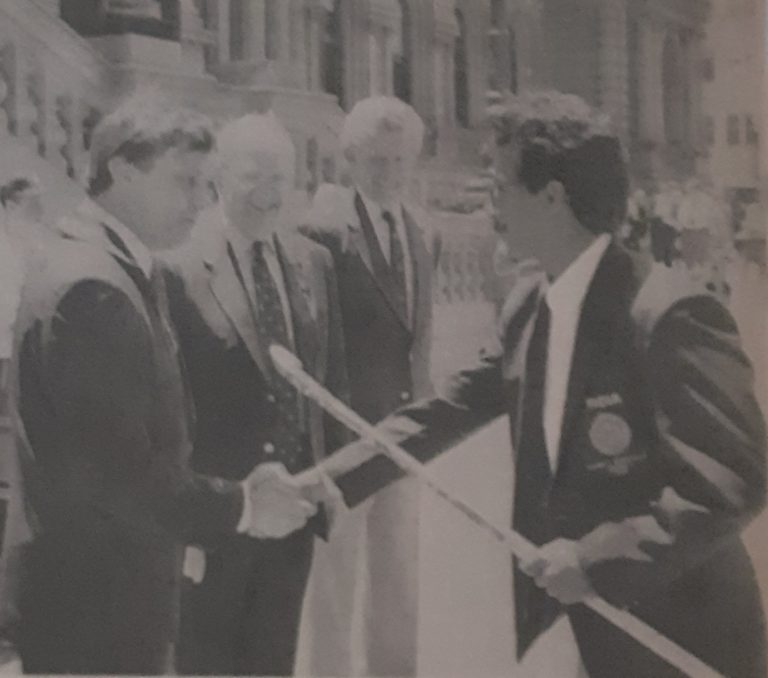
Captain Jude at the Sydney World Cup (press cutting)
Time went by. Jude returned to Bengaluru in early 2000.
He was considered fit to play in the National Championship held in South Zone. When the second leg moved to Jammu, the IHF announced him as selector as well. Midway through the Nationals in Jammu he was removed and Narinder Batra, who was the funder and organizer of the 2000 Senior Nationals, was given the job instead.
When asked for his opinion on the happening, pat came his reply: “I laughed it away”.
That’s Felix’s persona — mature and magnanimous.
I interacted with him when Malaysia and Singapore jointly hosted the 2009 Junior World Cup where he was a regular spectator for India matches in Singapore.
Felix was again in the news when he founded the Jude Felix Hockey Academy. A great effort and gesture for a player of his stature to start a charity for the sport. While most players of his generation were notorious for whining, he chose to be different. He thought of returning something to the game, that too in a systematic and proper manner, guiding scores of poor kids to a bright future.
PM PV Narasimha Rao handing over the Indira Cup Silver trophy to captain Jude. This was his last international
Midway through the current decade, he was invited to be part of the national coaching team. He was first with the senior team when the likes of Stephen van Ass was at the helm.
His complaint against Gurbaj Singh in 2015 which effectively sealed his career created mixed feeling among the knowledgeable. This was against the grain of Jude Felix, who always stood by players. The last word on the issue has yet to be heard. We will wait for his memoirs one day which may have them.
Jude was subsequently put in charge of the junior team, succeeding Harendra Singh. Such appointments often ran into approval, sanction or confirmation syndromes for which Sports Authority of India and Hockey India are primarily responsible.
The world haD now changed. The shorter version of the game, the Hockey Fives, began to make inroads. Felix took up the challenge head on. His boys led by Vivek Sagar Prasad, qualified for the Buenos Aires Youth Olympic Games where India won the silver medal. But Felix wasn’t sent with the team. Instead, High Performance Director David John travelled to the Argentine capital.
This Hockey India move sealed Felix fate as coach. However, he was back and coached the colts for various assignments. Overall, his coaching stints include the Sultan of Johor Cup (2017 & 2018) as well as the Antwerp and Breda age group events. However, his services were dispensed with midway through last year.
Felix’s long career was, as incidents prove, chequered but what distinguished him from the rest was his self-confidence and his wont to choose his own path. He was presented with the top coaching award, the Dronacharya, this year but it was the self-application stipulation which surprised him.
A playing career of 14 years, followed by many years of coaching foreign clubs and intermittent stints with Indian national teams as coach…the legacy of Jude Felix lives on.
Stick2Hockey.com
Kenyan international signs for German hockey side
By Agnes Makhandia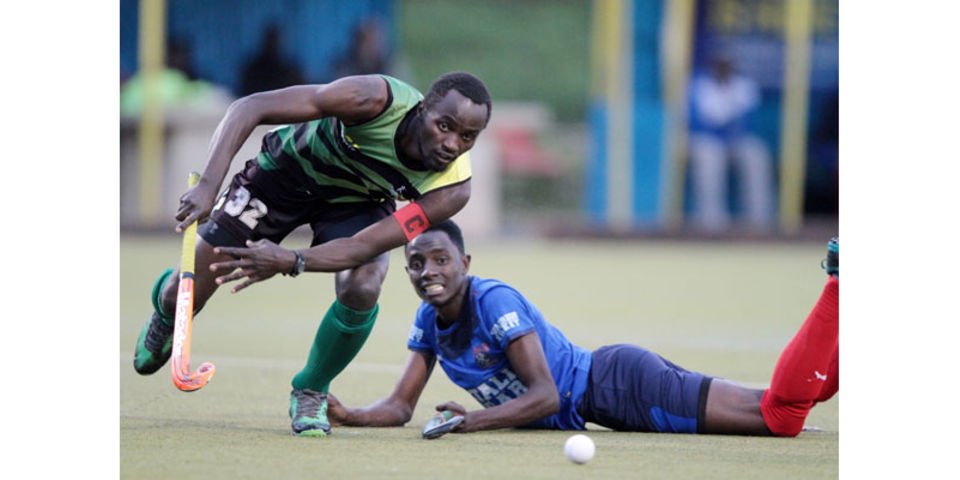
Kennedy Munialo (left) of Wazalendo leaves Butali Sugar Warriors’ Moses Ademba for dead during their Kenya Hockey Union Premier League match at City Park, Nairobi on June 15, 2019. File | Nation Media Group
Diminutive Kenya midfielder Moses Ademba cannot wait to hit the ground running after signing for German hockey side Stuttgart for six months ahead of the new season kick off next month.
The Butali Sugar Warriors player said that his dream to play in Europe has been fulfilled and it was now upon him to make the opportunity count.
"It has been my prayer to one day play in Europe. And now that the chance is here, I can only hope for the best. I want to leave a mark in the new team if not for the many upcoming players in Kenya, but for my team Butali who have made me a better player, having joined them last year from Multimedia University," said the 24-year-old.
"The facilities and technical aspect of the game are totally different from what what we have at home and I'm keen on taking full advantage of them to better myself.
I will put my right foot forward and hopefully my contract will be extended because I believe I'm just getting started,” he said.
Ademba will join compatriots Willis Okeyo of Kenya Police and Danston Barasa of Wazalendo who have a running contract with Stuttgart, but are yet to travel due to visa hitches as a result of the coronavirus pandemic.
The former Friends School Kamusinga player said his absence from Butali will not be felt, adding that the position has enough cover in Derrick Kuloba and Vincent Odhiambo.
"Butali cannot run short of talent. We have a pool of players to choose from and I believe my move to Europe will not change anything. In fact, what I will learn and pick from the new team will in a way impact Butali positively when I return," said Ademba, who made a debut to the national team last year during the Olympics qualifiers in South Africa.
Kenya flopped by finishing a distant fifth in the six-nation tournament that saw the hosts book the ticket to the bonanza which was rescheduled to next year in Tokoy, Japan.
Ademba, who scored four goals last season, said a lot needed to happen for the national team to return to winning ways.
"Facilities, technical aspect and prior logistics to prevous events have always been wanting and things will have change going forward. We gave good players but we get somethings wrong," he said.
Daily Nation
Irish Men’s EYHL2 expanded to 11 teams following Harlequins’ successful appeal
Cork Harlequins will compete in next season’s EYHL2.
Men’s EY Hockey League Division 2 will consist of 11 teams next season following Hockey Ireland’s decisions to create three extra places in the competition following three separate appeals over the make-up of the competition this week.
The Leinster, Munster and Ulster provincial branches of Hockey Ireland have all been offered an extra invitation to their original quotas, expanding the second tier from eight teams for the 2020/21 season.
It comes in the wakes of Cork Harlequins, Avoca and the Munster branch’s decision to appeal against the line-up announced on August 5th.
Quins and Avoca were both excluded from the entry list based on their performances in their local leagues – the former third in Munster, Avoca fifth in Leinster – which remains the criteria for entry into EYHL2.
Both saw that decision as a “relegation”, one which was particularly harsh on the Farmers Cross side who were leading their group when lockdown came, and so therefore not in keeping with the “null and void” announcement.
But the nature of EYHL2 is that it is officially “reconstituted” each season rather than being subject to promotion and relegation.
That reconstitution is arrived at by each provincial branch nominating clubs to take up their allocated quota and it was this point on which Cork Harlequins’ appeal succeeded and Avoca’s was turned down.
Initially, Munster Hockey nominated Cork C of I and Harlequins to be their two entries for the 2020/21 season on the basis their local leagues would be declared null and void. This was communicated to Hockey Ireland who subsequently advised regional leagues should be decided on a percentage equalisation method.
To complicate matters, a proposal generated by the Hockey Ireland Competitions Working Group was incorrectly communicated to Harlequins and the Munster branch that EYHL2 would be expanded to ten teams. This came with an assurance it would have been made up of qualifying teams from 2019/20 season along with entrants from last term.
Under the understanding both Harlequins and Bandon – second place finishers in Munster – would be involved and so, on that basis, the southern province agreed to change their nomination to Cork C of I and Bandon on condition of inviting Harlequins into the extended format.
Because of this, the HI appeals panel concluded that: “Cork Harlequins were treated unjustly, as a result of miscommunications of the position and interference with the prior nomination by Munster Branch of Harlequins, by representatives of Hockey Ireland, which resulted in their exclusion from the EYHL2 2020/21 season.
“In the circumstances, Cork Harlequins appeal against the decision to exclude Cork Harlequins from participation in EYHL2 2020 / 2021 season is upheld. It is a matter for Hockey Ireland to make the necessary arrangements to permit their participation.”
Harlequins’ appeal was supported in part by Munster Hockey’s contesting of Hockey Ireland’s decisions over the make-up of the league, a challenge that was partially upheld.
The appeals panel concluded: “that the competition working group of Hockey Ireland failed to respect the autonomy of Munster in the selection of the teams who are to go forward; intervened in the decision by Munster Branch which led to the substitution of Cork Harlequins by Bandon; led Muster Branch to the belief that an additional team would be admitted which played a role in the decision to substitute Harlequins and, in doing so, a specific unfairness and injustice was visited upon Cork Harlequins.
“The finding made, however, in relation to Cork Harlequins takes account of the specific circumstances of that club and the particular injustice caused to them by these events.”
The panel found “while Hockey Ireland must be responsible for any mis-communications by its sub-group, the panel does not support the appeal of Munster Branch Hockey Ireland in respect of the requirement that Hockey Ireland accept the recommendations of the commission committee working group which is a matter of executive decision for Hockey Ireland and, outside the powers of the relevant committee.”
This is where Quins appeal succeeded and Avoca’s bid diverged. For Avoca, the appeals panel acknowledged “genuine concerns” but said the Hockey Ireland decision not to expand EYHL2 was “within the range of reasonable decisions and reflected a choice made in a complex and evolving situation, where consensus had not been reached among the principal stakeholders of Hockey Ireland”.
“Furthermore, the decision or otherwise to increase the number of participating clubs would not necessarily have served Avoca which was not the next ranked club and, which was not one of the clubs elected by Leinster Branch.”
Unlike Munster, this was “not a situation… where Leinster Branch was led into error based on any expectation that the number of teams would be increased and… there was no expectation specific to Avoca which arose by virtue of communication between Hockey Ireland and Leinster Branch.”
The appeals ruling left the reconstitution of EYHL Division 2 in the hands of Hockey Ireland with Harlequins required to be part of the competition.
To account for this, Hockey Ireland announced on Wednesday there will be an extra team from Leinster, Munster and Ulster on a one-year basis.
Who takes those tickets is at the behest of each province to dole out although the Hockey Ireland statement recommends “additional teams are to be selected on a merit basis in line with the current nomination process as outlined in the Hockey Ireland Competition Rules”.
On such a basis, Mossley would be best placed to be offered the Ulster spot with Rathgar would be in line for the Leinster ticket by virtue of their fourth place finish. Munster will nominate C of I, Harlequins and Bandon.
Whether it will be a single division of 11 teams or broken up into smaller groups remains to be seen but obviously means the fixture list issued a few hours before the appeals took place will have to be ripped up.
But it will, more than likely, lead to further concerns – raised at various points this summer – over the volume of matches and the associated player welfare issues.
The Hook
England Hockey set to meet to discuss Step 5 resumption
The EH Championships were staged this weekend at Beeston PIC: England Hockey
England Hockey will meet on Monday to discuss signalling the final green light for hockey to resume competitive league action.
The national governing body is expected to make a decision on moving to Step 5 after last week’s announcement or if more time is needed to work with clubs.
Nick Pink, England Hockey’s chief executive, told The Hockey Paper: “We wanted to get to certain level of mass before we are able to commit to Step 5. We will be reviewing it on Monday.”
Capability remains the “most significant concern” and the final decision will still be “a judgement call” from England Hockey.
“We know one of the biggest challenges is facility access, particularly on school sites,” added Pink.
“We have given guidance to leagues and tried to be as flexible as we can and that extends to facilities.”
The English domestic leagues are set to return this month, with the top flight due to start on Sep 19-20 with leagues being given the recommended dates by EH.
With recent rises in coronavirus cases over the last few days in England, there will be an anxious wait to see if further outbreaks are detected with students returning to universities.
Given that several universities are preparing for Premier Division hockey this season, a rise in positive cases could have a serious impact on the leagues.
Meanwhile, England Hockey staff will slowly be able to work back at Bisham HQ from this week. Pink has been working away from the office since mid March.
Editor’s message
For us to continue to provide quality hockey news, we are asking you to subscribe to our newspaper in print or digital.
The pandemic has had a major impact on our advertisers and our business as we aim to keep bringing you the best hockey coverage and we are more reliant on subscriptions than ever before.
We have continued to keep up news and views since lockdown with no advertising and so we are asking readers to help keep supporting us.
Does your club have interesting news or features? Email us!
Help keep independent journalism alive in these uncertain times. Ahead of the new season, please subscribe in print or in digital format.
The Hockey Paper
England Hockey positive over sponsorship talks as partners line up
By Rod Gilmour
England Hockey chiefs are holding advanced staged talks with potential commercial partners, underlining the continued appeal of the sport’s visibility after a successful last decade for sponsors.
Investec ended its long association with hockey earlier this year, but in a major boost for the sport it is understood the national governing body is exploring “three or four different conversations” with suitors, with one at an advanced stage. England Hockey hopes to make an announcement in the coming weeks as it also looks for cross gender sponsorship.
“Hockey is a really interesting proposition for people, there’s no doubt,” Nick Pink, England Hockey’s chief executive, told The Hockey Paper. “There is a really positive window with the return to regular team sports and we’re at the heart at it.
“For a commercial partner that is quite attractive and particularly the gender balance. There is a strong platform.”
With the looming return of league hockey, the EuroHockey Championships, Olympics, Commonwealth Games and cycle leading to Paris 2024 packed into the next three years, EH says that sponsorship is an “attractive proposition”.
Pink added: “I’m confident as I can be and I’m hopeful for news in the coming weeks for various sponsors on board.”
In an upcoming THP interview with GB Hockey’s former commercial director Jonathan Cockroft before he left the sport, he said that the women’s shirt was one of the “hottest properties” in women’s sport.
Pink concurred and added: “We don’t want to undervalue it but we have to hold true what the value is and the associaion of the shirt.”
But with the sport without a men’s sponsor since Now:Pensions and the short-lived Toshiba deal, England Hockey has placed the men’s and women’s leagues as part of its talks.
“We want to position hockey as a sport rather than men and women,” said Pink. “We have been looking across the sport and whether that happens or not will be determined as the negotiations continue.”
Any announcement is unlikely before the start of the Premier Division campaigns, which will both begin without a sponsor.
News that hockey is engaging with companies is, however, a positive step following the end of Investec’s deal.
It follows the announcement that Vitality, sponsor of the 2018 hockey World Cup, is backing six football clubs this season, covering both men’s and women’s teams, adding to recent reports that CVC Capital Partners, a former private equity backer of F1, is mooting a bid for a stake in English football’s Women’s Super League.
Editor’s message
For us to continue to provide quality hockey news, we are asking you to subscribe to our newspaper in print or digital.
The pandemic has had a major impact on our advertisers and our business as we aim to keep bringing you the best hockey coverage and we are more reliant on subscriptions than ever before.
We have continued to keep up news and views since lockdown with no advertising and so we are asking readers to help keep supporting us.
Does your club have interesting news or features? This email address is being protected from spambots. You need JavaScript enabled to view it.
Help keep independent journalism alive in these uncertain times. Ahead of the new season, please subscribe in print or in digital format.
The Hockey Paper
FIH delegates its global anti-doping program to the International Testing Agency (ITA)
Lausanne, Switzerland: The International Testing Agency (ITA) welcomes the International Hockey Federation (FIH) as its newest partner in the fight for clean sport. The ITA will manage the entire anti-doping program of the Olympic team sport, the FIH will retain results management.
The FIH has decided to have its entire anti-doping programme run independently by the ITA. A four-year contract between the two organisations marks the start of cooperation. In a transitional phase until the end of 2020, the ITA will initially manage FIH’s out-of-competition testing activities, and from the beginning of 2021 the full anti-doping program. This includes in- and out-of-competition testing, athlete blood passport administration, therapeutic use exemption management, risk assessment, test distribution planning, whereabouts and compliance management. The FIH will maintain the results management within its structures.
Based on the shared conviction of the two organisations that knowledge and prevention are crucial factors in deterring athletes from using prohibited substances – deliberately or inadvertently – an emphasis will be put by the ITA on rolling out a strong education program for the FIH.
“The ITA is excited to welcome another team sport to the ranks of its partners”, says Benjamin Cohen, Director-General of the ITA. “Hockey is a true global sport with both strong female and male teams, and a sport with a long Olympic tradition. The delegation of its global anti-doping program shows the federation’s commitment to fair play and means that the FIH will profit from the ITA’s knowledge and expertise. We will tailor our anti-doping program to the specificities of hockey, but the FIH will also be able to access solutions and intelligence from the other sports the ITA partners with.”
FIH CEO Thierry Weil: “We are very pleased to announce this partnership with the ITA, which is part of our continuing efforts to maintain a world class anti-doping programme for hockey around the world. Using this independent agency of anti-doping experts will ensure we continue to be at the forefront of efforts to educate our athletes and maintain the integrity of our competitions.
FIH site
ITA to oversee hockey anti-doping programme after four-year contract signed with FIH
By Michael Pavitt
The International Hockey Federation (FIH) has signed a four-year contract with the International Testing Agency (ITA), which will see its entire anti-doping programme transferred to the organisation.
The FIH is the latest Olympic federation to transfer its anti-doping programme to the ITA, although the governing body will remain in charge of the results management process.
The organisations said there will be a transitional phase until the end of 2020, which will see the ITA initially manage the FIH’s out-of-competition testing activities.
From the beginning of 2021 the ITA will assume responsibility for the overall programme, including in- and out-of-competition testing, the athlete blood passport administration, therapeutic use exemption management, risk assessment, test distribution planning, whereabouts and compliance management.
The ITA is expected to roll out an education programme for the FIH as part of the agreement.
"We are very pleased to announce this partnership with the ITA, which is part of our continuing efforts to maintain a world-class anti-doping programme for hockey around the world," FIH chief executive Thierry Weil said.
"Using this independent agency of anti-doping experts will ensure we continue to be at the forefront of efforts to educate our athletes and maintain the integrity of our competitions."
The ITA runs anti-doping programmes for more than 45 International Federations and organisers of major events.
The governing bodies of boxing, judo, gymnastics, table tennis and weightlifting are among those to have partnered with the ITA.
The International Cycling Union announced earlier this year it would transfer its operations from the Cycling Anti-Doping Foundation to the ITA from 2021, with a cycling unit set to be established.
ITA director general Benjamin Cohen has welcomed the FIH as the latest Olympic federation to partner with the organisation.
"The ITA is excited to welcome another team sport to the ranks of its partners," Cohen said.
"Hockey is a true global sport with both strong female and male teams, and a sport with a long Olympic tradition.
"The delegation of its global anti-doping programme shows the federation’s commitment to fair play and means that the FIH will profit from the ITA’s knowledge and expertise.
"We will tailor our anti-doping program to the specificities of hockey, but the FIH will also be able to access solutions and intelligence from the other sports the ITA partners with."
The ITA began operations in June 2018, with its creation having been approved by the International Olympic Committee's Executive Board in July 2017.
Inside the Games
Vale Patricia Haigh (nee Murphy)
Hockey Australia is saddened to learn of the passing of former Hockeyroo Patricia Haigh (nee Murphy) at the age of 89.
Patricia was the 21st player overall to represent South Australia and became the 143rd woman capped for her country.
She made her Australian debut on Wednesday 30 September 1953 against England and went on to play a total of nine internationals, scoring one goal against Austria.
Patricia was selected in the All Australian Blue Ribbon (Virtual) team for 1951 and 1952, and again in 1954.
In 1953, she toured Great Britain with the Australian team, competing in the 1953 International Federation of Women’s Hockey Associations Conference and Tournament held in Folkestone UK, a forerunner event to the Women’s World Cup.
Patricia was chosen in a World XI after this tournament.
Hockey Australia sends its deepest condolences to Patricia’s family and friends during this sad time.
Information courtesy of John Sanders
Hockey Australia media release
